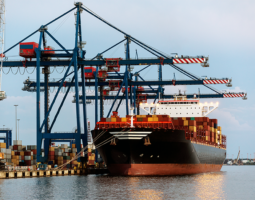Trade and Transportation Under a Biden-Harris Administration
President-elect Biden, even without GSA “ascertainment” as of this writing, has begun the process of assembling his teams who will review Cabinet-level departments, relevant agencies and Executive Offices under the jurisdiction of the White House. Those committees are available to view on the transition’s website, but the bigger question for importers, exporters, domestic manufacturers and others in logistics is, “What will change beginning January 20th?”
We are monitoring the process and are drawing our own conclusions based on comments made during the campaign and some of the names being floated for leadership positions.
There are two categories of information that we’re monitoring – agencies and policies. Both are intertwined, but let’s first make a list of the agencies and why they matter and then delve into what those agencies will be doing with existing or future trade issues that will need to be addressed.
A few departments and agencies to watch:
- The Department of Transportation will have jurisdiction over rules governing truckers, hours of service, training and drug screening. At a time when trucking rates are soaring and the number of drivers is declining, any steps taken by the DOT and the FMCSA (Federal Motor Carrier Safety Administration) in this area will be of importance to companies who need to move cargo around the United States. DOT will also be at the forefront of rail and road initiatives (read: infrastructure).
- The Department of Homeland Security is home to the Transportation Security Administration (TSA) and Customs and Border Protection (CBP). TSA’s authority covers the movement of air cargo on passenger and cargo aircraft. Rules changes coming in 2021 regarding cargo screening could impact US exports while advanced information reporting initiatives could change the questions we ask our importers before air cargo can be loaded. Think ISF for air freight. CBP will be tasked with border security and enforcement of trade laws along with decisions put forth by Congress, the International Trade Commission and the Office of the US Trade Representative.
- Health and Human Services is home to the Food and Drug Administration, an agency whose role in the admissibility of PPE and soon vaccines will be brought to the forefront. Importers have had heartburn with the agency over the years with their communication and speed of examination and release of cargo – we’ll be watching them closely.
- The Federal Maritime Commission (FMC) is an independent agency with jurisdiction over ocean carriers and marine terminal operators. Given the current situation in Southern California, the agency will swiftly be pressed into taking action to alleviate the congestion and will play a role in the demurrage and detention activities costing businesses millions of dollars in unnecessary additional transportation costs.
- The Office of the US Trade Representative (USTR) is responsible for the initiation of the Section 301 and Section 232 investigations. Whether the new administration continues or rescinds them – including the recently-closed-for-comments investigations into Vietnam – remains to be seen.
Though no people have been officially tapped for leadership positions, it is widely anticipated that Cabinet secretary nominees will start to come out after Thanksgiving.
Turning our focus outward, here are four issues that the incoming administration will need to address to remove uncertainty and provide stability for importers and exporters.
- Section 301 duties from China have added billions of dollars in added expense to importers of Chinese-manufactured goods. Some importers have set up warehousing outside the United States and are utilizing Section 321 / Type 86 entries to bring items in to ultimate consignees free of regular duties and trade remedy duties such as Section 301. It will be up to the incoming administration to determine whether or not to continue them under the original reason of intellectual property theft and counterfeiting or to choose another path to negotiate on a wider array of China issues.
- The US hobbled the WTO’s appellate board by refusing to provide funding. The US and EU now find themselves imposing additional duties on key exports from each region in response to the Boeing / Airbus findings. Will both sides find a way to resolve the issue?
- Hard decisions are approaching the UK and EU as the final shape of the separation that must take place on January 1st comes into view. The Biden team has already said that the priority is not on a US / UK bilateral agreement, but a trilateral arrangement involving the US, EU and UK.
- President Trump issued a memorandum to the Department of Homeland Security to come up with a way to better manage counterfeit, antidumping and IPR-infringing items through e-Commerce. With an $800 de minimis level, this will only increase in importance, especially as concerns around duty avoidance, potential product efficacy and the importation of harmful narcotics continues through the e-Commerce and mail supply chains.
Whether it is our customs brokerage or consulting divisions, we at Scarbrough remain attentive to the continued trade policy updates and announcements from the White House or published in the Federal Register for notice and comment.
We will continue to monitor and advise with the goal of providing proactive notice of changes that will impact our customers’ supply chains and, where available, identifying potential savings at a time when it feels like nearly every supply chain input cost is on the rise.

